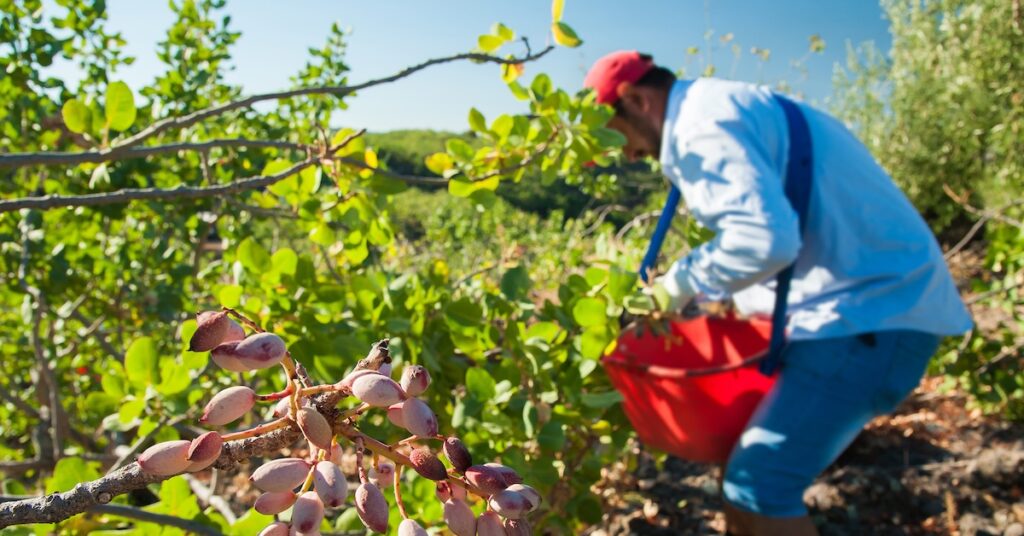
July/August 2025
Immigration uncertainty
The Trump administration has walked back comments that seemed to suggest support for immigration enforcement changes that would avoid targeting farm workers.
On July 8, U.S. Agriculture Secretary Brooke Rollins said there will be “no amnesty” for agricultural workers as President Donald Trump’s administration moves to deport all immigrants in the country illegally.
“Ultimately, the answer on this is automation, also some reform within the current governing structure,” Rollins said in a news conference at USDA headquarters in remarks reported by Reuters. “And then also, when you think about — there are 34 million able-bodied adults in our Medicaid program. There are plenty of workers in America.”
Most adults on Medicaid work full- or part-time or are not working due to illness or disability, caregiving or school attendance, according to health policy organization KFF.
In comments at a June 12 news conference, as immigration raids drew protests in major U.S. cities such as Los Angeles and Chicago, Trump denied U.S. Immigrations and Customs Enforcement (ICE) officials are targeting agricultural workers but indicated measures to shield them from ICE action might be forthcoming.
“Our farmers are being hurt badly by — you know, they have very good workers. They’ve worked for them for 20 years,” Trump said. “They’re not citizens, but they’ve turned out to be, you know, great. And we’re going to have to do something about that. We can’t take farmers and take all their people and send them back because they don’t have maybe what they’re supposed to have, maybe not.
“And you know what’s going to happen and what is happening? They get rid of some of the people because, you know, you go into a farm and you look and people don’t — they’ve been there for 20, 25 years and they’ve worked great. And the owner of the farm loves them and everything else. And then you’re supposed to throw them out and you know what happens? They end up hiring the people, the criminals that have come in, the murderers from prisons and everything else.
“So we’re going to have an order on that pretty soon. I think we can’t do that to our farmers and leisure too — hotels. We’re going to have to use a lot of common sense on that.”
Uncertain path
The Washington Post reported that after Trump’s June 12 comments, Department of Homeland Security officials told agents to pause raids on agriculture, including meatpacking plants, as well as restaurants and hotels. On June 15, however, DHS said the White House did not support that policy, according to the Post, with ICE agents told to continue raids at those businesses.
 On June 17, CBS News reported that ICE officials were told they could continue carrying out raids on farms, hotels and restaurants.
On June 17, CBS News reported that ICE officials were told they could continue carrying out raids on farms, hotels and restaurants.
In a July report, Oregon Public Broadcasting talked to an Oregon cherry grower who said some workers aren’t showing up for harvest because of fears of ICE. Bay Area public broadcasting station KQED reported federal immigration enforcement actions involving farm workers in multiple regions of California including Ventura, Kern, and Tulare counties in June.
On July 10, protesters and federal officials clashed at a Southern California farm. The Associated Press reported that Glass House Farms, permitted to grow cannabis in Camarillo, said it was visited by ICE agents. The Los Angeles Times reported that around 200 undocumented workers were arrested.
One worker died on July 11 from injuries suffered in the raid, according to reports from media outlets including Reuters and The Guardian.
“California agriculture depends on and values its workforce,” the California Farm Bureau said in a June 13 statement in response to enforcement activities.
“Farm employees are not just workers — they are partners in this industry,” Bryan Little, senior director of policy advocacy at the California Farm Bureau, said in the statement. “The current approach to federal immigration enforcement is having a disruptive effect on California’s rural communities and the farmers, ranchers, workers and families who live and work there.”
One-third of the nation’s agricultural workforce is located in California, the country’s leading producer of fruits, vegetables and nuts, according to the statement. Without these employees, Little said, crops would go unharvested and food prices could rise nationwide.
“If federal immigration enforcement activities continue in this direction, it will become increasingly difficult to produce food, process it and get it onto grocery store shelves,” Little said. “A stable and reliable workforce is crucial to maintaining the nation’s food security.”
Industry reaction
The International Fresh Produce Association (IFPA) issued a statement in mid-June emphasizing the need for affordability and predictability for farming operations.
 “Enforcement actions targeting agricultural laborers are highly disruptive to farm operations and the produce supply chain consumers rely on,” IFPA said. “They are also the culmination of decades of inaction from policymakers and a broken labor system.”
“Enforcement actions targeting agricultural laborers are highly disruptive to farm operations and the produce supply chain consumers rely on,” IFPA said. “They are also the culmination of decades of inaction from policymakers and a broken labor system.”
IFPA established an online link to connect constituents concerned about agriculture labor issues to the appropriate member of Congress.
Additionally, IFPA members are encouraged to contact John Hollay, director of U.S. Government Relations, to share information or concerns about enforcement activity affecting their farms or facilities.
In a statement issued in mid-June, Maureen McGuire, CEO of the Farm Bureau of Ventura County, said that between 25% and 45% of farmworkers have not reported to work following the start of large-scale immigration raids.
“When our workforce is afraid, fields go unharvested, packinghouses fall behind and market supply chains, from local grocery stores to national retailers, are affected,” McGuire said in the statement. “This impacts every American who eats.”









